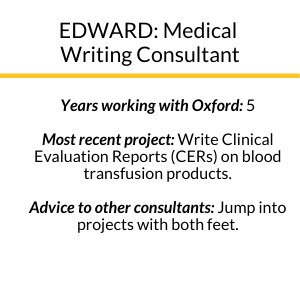Meet Edward: Edward is a medical writing consultant with experience in almost every therapeutic area including drug and medical device development, regulatory, and publications. In 2002, Edward decided to transition from his role in academic medicine as a professor of physiology and pharmacology to full-time consulting in the drug and medical device industries. He found that he fit comfortably into the medical writing niche based on his extensive background in scientific publications, prior experience in regulatory writing, and familiarity with the drug and medical device development and approval process. He also enjoyed the flexibility of location that consulting afforded him.
 Edward started working with Oxford in 2015 after an initial conversation with his recruiter. He chose to join Oxford’s network because he liked the people — they were professional, no-nonsense, and lacked the head-hunter mentality he had come to know with other recruiters. “I’m selective about the recruiters I work with,” Edward said, “but I felt comfortable working with Oxford.”
Edward started working with Oxford in 2015 after an initial conversation with his recruiter. He chose to join Oxford’s network because he liked the people — they were professional, no-nonsense, and lacked the head-hunter mentality he had come to know with other recruiters. “I’m selective about the recruiters I work with,” Edward said, “but I felt comfortable working with Oxford.”
Edward’s recruiter, Ted, continues to touch base with him every couple of weeks to give regular updates and ensure he has an awareness of potential new opportunities.
About his most recent project: Edward has been consulting full time writing Clinical Evaluation Reports (CERs) on blood transfusion products for a global provider of blood and plasma supplies and services. They had several devices that needed CER updates to be in compliance with new European Union Medical Device Regulations (MDR). Edward found that this was a learning opportunity for him — although he was unfamiliar with the details of many of the devices involved and variants in transfusion medicine, he approached each report with the mindset that he would provide nothing less than his absolute best.
“There were many Class 2 devices such as blood filters and automated apheresis products used in transfusion medicine that required CER updates. Many of them had not been updated for 10 years. Each clinical update requires an extensive literature review — sometimes as many as 1,000 articles per device, even though only five or 10 papers meet the specific selection criteria for inclusion in a report.
Edward developed an excellent working relationship with the client. “I asked several questions at the beginning, and they treated me with a great deal of professional respect. They recognized that I have a lot of experience working with these reports and were very open to my assessment of what was needed in the CER updates to be in compliance with the MDR. Medical writing doesn’t always lend itself to a traditional schedule and deadlines, and accurately predicting the time required to complete a document like a CER is not always on the mark. This particular company understood that and has been flexible about deliverable dates. Of course, it is always better to complete a deliverable before the predicted due date, but sometimes one needs a few more days to finish a quality document than originally predicted,” Edward said.
When thinking about the guidance he would give to someone new to consulting, Edward’s advice is simple: “Jump into projects with both feet. Immerse yourself. Learn as much basic and clinical science relating to the project as you can. Do the best you can, don’t cut corners, and be committed — it will pay off. If you need to extensively revise a previously poorly written document, start from scratch,” he adds, “don’t try to repair what is wrong, especially formatting. Start over and do it correctly from the beginning.”
Edward is a meticulous professional with an intensely committed work ethic who takes each project seriously. His academic background allows him to communicate clearly and effectively with clients, who are also charmed by his friendly demeanor. Edward is an in-demand asset for any organization looking for medical writing expertise.
.svg.png)


